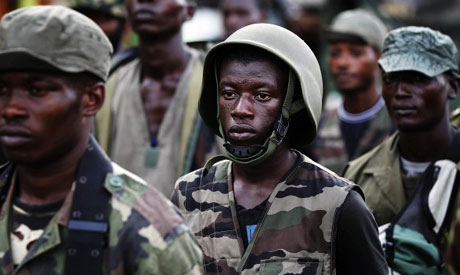
New recruits from the Republican Forces of Ivory Coast gather at a base in Abidjan. Since former strongman Laurent Gbagbo was arrested last week, Ivory Coast President Alassane Ouattara has been trying to restore order in Abidjan, (Reuters).
Nine days after former President Laurent Gbagbo was captured, his die-hard forces were still battling troops of Ivory Coast's democratically elected president on Wednesday in an Abidjan neighborhood, leaving civilians in the crossfire.
While shelling shook the walls of homes in the Yopougon suburb, the rest of Ivory Coast's commercial capital tried to inch back to normality.
Traffic was returning to the streets and shops were reopening, though there were shortages of many things _ including money. Banks have not reopened and officials said they were trying to get currency sent in from the West African regional bank in Dakar, Senegal.
William Dufourcq of Action Against Hunger said the fighting was so intense in Yopougon that his French charity could not get in to deliver water to around 4,000 people who have sought shelter at a church there. A resident of the sprawling suburb said Wednesday that troops loyal to elected President Alassane Ouattara were lobbing shells into the neighborhood and pro-Gbagbo civilian supporters were trying to get out.
Ghana said Wednesday it evacuated its diplomats, with Ghana's Foreign Minister Mohammed Mumuni citing "the deteriorating security situation." Ouattara's top commanders were at the scene of the renewed fighting, said guards at the former Republican Guard military headquarters which is now being used by the emerging armed forces.
A few government workers returned to work this week, and more joined them on Wednesday. But many government buildings, including parliament, have been looted of computers and furniture.
Haled Traore, a commander of soldiers who helped install Ouattara to power on April 11, said the fighters have been ordered to return looted vehicles and owners who present papers for the vehicles would have them returned. Hundreds of vehicles taken by pro-Ouattara forces remained at a gas station at Gesco, just north of Abidjan.
"We needed them to prosecute the war," Traore told The Associated Press "The war is over." Given the continued fighting in Yopougon, that statement might be premature, though the level of fighting was much less intense than in previous weeks.
Gbagbo had stubbornly refused to accept defeat in the Nov. 28 elections and took a final stand in Abidjan, where his soldiers turned rockets and mortars on civilians.
More than a million people fled the capital, and another million have been displaced inside Ivory Coast or are refugees in neighboring countries.
Thousands have been killed and wounded with both sides committing atrocities during the four-month standoff, according to the Geneva-based International Federation for the Red Cross.
Ivory Coast had been divided between north and south since a 2002 rebellion against Gbagbo. Nov. 28 elections were supposed to reunite the West African country, which is the world's main cocoa producer.
Short link: